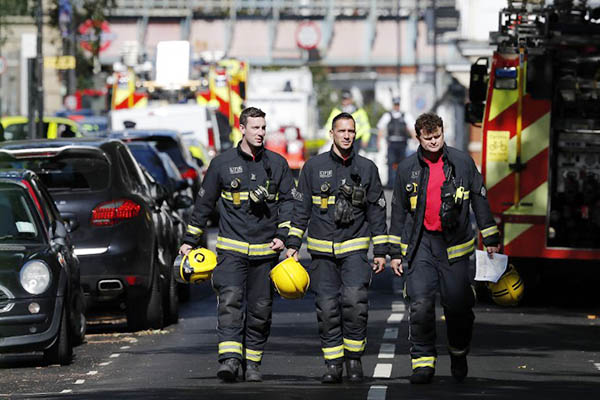
Adrian Dennis—AFP
U.S. president, in latest twitter tirade, appeared to suggest British authorities had failed to prevent bombing
U.S. President Donald Trump sparked fury in London and yet another pointed rebuke from Prime Minister Theresa May on Friday after he claimed “loser terrorists” behind a botched train attack were known to British police.
Trump took to Twitter to condemn an attack on a packed London Underground train that injured 22 people, but also appeared to suggest that British authorities had dropped the ball. “Another attack in London by a loser terrorist,” the U.S. president tweeted. “These are sick and demented people who were in the sights of Scotland Yard. Must be proactive!” Trump added, appearing to reveal undisclosed intelligence from the headquarters of London’s Metropolitan police force.
That online broadside brought a terse public response from May, who warned the U.S. president and others not to speculate. “I never think it’s helpful for anybody to speculate on what is an ongoing investigation,” May told journalists in London.
Trump later tried to smooth over the rift, describing May as a “wonderful woman.” But his comments were described as “unhelpful” by London’s Metropolitan Police, as well as by Nick Timothy, May’s former chief of staff.
“True or not—and I’m sure he doesn’t know—this is so unhelpful from leader of our ally and intelligence partner,” Timothy wrote on Twitter.
After his tweets, and with ties apparently under strain, Trump spoke with May to convey “his sympathies and prayers” for victims of the London attack, the White House said in a statement. “The president pledged to continue close collaboration with the United Kingdom to stop attacks worldwide targeting innocent civilians and to combat extremism.”
Trump’s keenness to underline a series of terror attacks in Britain, virtually in real time, has led to repeated outcry across the Atlantic that has helped indefinitely delay his much-vaunted state visit to the country.
In May, British officials were furious after their U.S. counterparts leaked shared material about an investigation into a bomb attack at a concert by pop star Ariana Grande in Manchester, which left 22 dead. The bomber’s identity and details of the probe leaked to U.S. media before British officials felt ready to disclose them.
Trump’s domestic political message risked fraying decades old trans-Atlantic ties, a day after U.S. Secretary of State Rex Tillerson, speaking in London, hailed a relationship that is “as special today as it has ever been.”
After an attack in London in June, Trump had lashed London’s Muslim mayor Sadiq Khan for telling the public there was “no reason to be alarmed” over armed police on the streets. On that occasion, May was forced to upbraid the U.S. leader, saying “I think Donald Trump is wrong in what he said about Sadiq Khan” after the London Bridge attack.
In March, the White House left British spooks apoplectic when it cited unproven media reports that president Barack Obama had asked Britain’s signals intelligence agency, GCHQ, to monitor then-candidate Trump in order to “make sure there were no American fingerprints.” The normally tight-lipped agency called the allegations “nonsense,” adding that “they are utterly ridiculous and should be ignored.”
Trump also used Friday’s London train attack to renew calls for his controversial ban on travelers from several predominantly Muslim countries—a rallying cry of his right-wing base who have recently been angered by his support for an amnesty for some illegal immigrants. “The travel ban into the United States should be far larger, tougher and more specific—but stupidly, that would not be politically correct,” the president said in a series of tweets.
Later in the White House Rose Garden, Trump expressed exasperation at how terrorism “just keeps going and going,” and signaled he wanted harsher penalties for terrorists. “We have to be very smart, and we have to be very, very tough,” he said. “We’re not nearly tough enough.”
